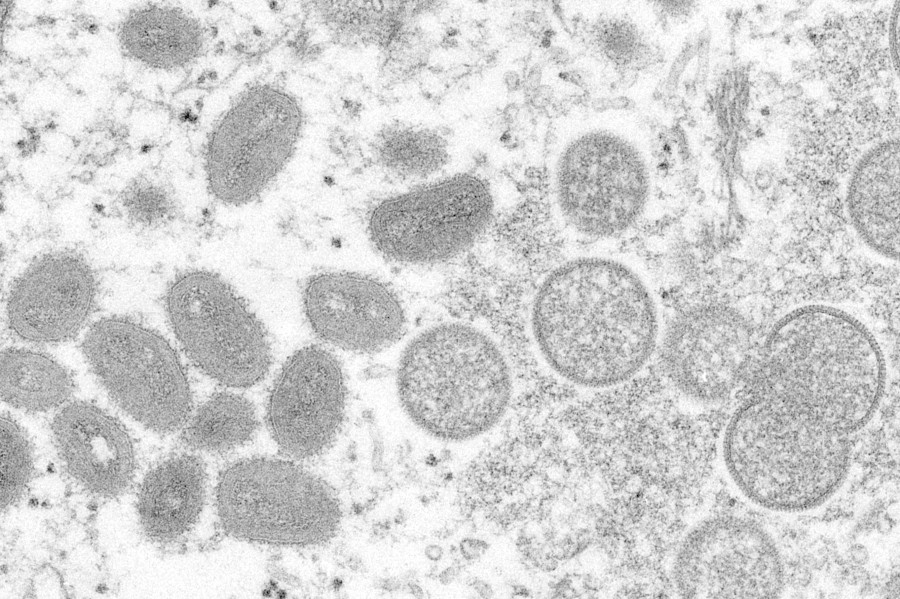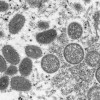Can Chicago slow the spread of monkeypox?
Fatigue from the COVID-19 pandemic and a shortage of monkeypox vaccines are raising questions over whether the spread of the virus can be contained.
Wednesday, July 20, 11:40 a.m. CT
URL Copied!

This 2003 electron microscope image made available by the Centers for Disease Control and Prevention shows mature, oval-shaped monkeypox virions, left, and spherical immature virions, right. Cynthia S. Goldsmith, Russell Regner / CDC via Associated Press
The amount of people waiting for a monkeypox vaccine outside Test Positive Aware Network in Edgewater on Monday quickly outnumbered the 100 doses the nonprofit had available.
Standing in the heat, people who learned they wouldn’t get a shot tried to help one another out by passing around phones to share social media posts and texts about where else they may be able to find a vaccine, said a local writer and artist who goes by the name Kal Jazeera, who called Howard Brown Health Center from the line to see if he could get an appointment.
TPAN CEO Kara Eastman said the nonprofit was prepared for high demand, but the level of turnout was “overwhelming.”
The frustrating scavenger hunt for a vaccine comes as monkeypox cases near 200 in Chicago. The rare disease that can lead to a rash is spread primarily through skin-to-skin contact or prolonged intimate contact like kissing, cuddling and sex. The virus began spreading internationally this year and has now been reported in most major U.S. cities. In Chicago, like elsewhere, “most, but not all” of the cases have been reported in gay and bisexual men, or other men who have sex with men, Dr. Allison Arwady said, but stressed that anyone can get monkeypox.
While the overall cases remain low compared to the COVID-19 outbreak, Dr. Anthony Fauci, the country’s top medical official, warned over the weekend that “we have to act like it will have the capability of spreading much more widely than it’s spreading right now.” In Chicago, vaccines have been made available to those most at risk of being exposed to the virus, but demand has far outpaced supply.
- RELATED STORY
Chicago announced its first probable case of monkeypox — here’s what to know about the disease
read more
“The severity and the concern and urgency to get vaccinated has really come up very quickly, because it got close to home really fast,” Kal Jazeera said by phone Tuesday afternoon. “I currently know one person with monkeypox and I know about eight to 10 people who have been exposed.”
As of Tuesday, Chicago has received and distributed about 5,000 doses of the monkeypox vaccine, Jynneos, with approximately 15,000 more doses expected to start arriving as early as this week.
But Arwady, the city’s top doctor, acknowledged in a weekly Facebook Live event on Tuesday that even 15,000 doses isn’t enough.
“Many many more people would like to get this vaccine than we have available for,” she said. “As vaccine supply increases, I expect this will evolve and we will likely recommend it to more individuals.”
Here’s how the city is prioritizing who is able to get the two-dose vaccine at this time. It is not recommended for the general public, including men who have sex with men but don’t have other listed risk factors:
If you have had close physical contact or were intimate with someone who has been diagnosed with monkeypox.
If you are gay, bisexual or a man who has sex with men and have had sexual contact with other men in a social venue or otherwise have had multiple anonymous partners and therefore may not be able to adequately contact trace.
Arwady said the low number of vaccines available is, in part, because of the infrequency of monkeypox outbreaks in the United States.
“Because MPV is really rare, it’s not like there’s lots and lots of this vaccine just sitting on the shelf, your doctor does not just have it in their office, your pharmacist does not have it on the shelf,” she said, adding that the vaccines available have come from the Strategic National Stockpile maintained by the federal government in case of disease outbreaks.
Dr. Anu Hazra of Howard Brown Health Center said the nonprofit LGBTQ health care provider has been “inundated with calls” — hearing from as many as 200 people a day looking for testing or a vaccine.
“What concerns me is how can we tamp down transmission?” Hazra said. “A lot of us talked about how ‘COVID zero’ is sort of an impossible goal, but monkeypox zero should be very much possible. We have the tools to stop it.”
In addition to testing and vaccines, Hazra is recommending that people consider tightening their sexual networks. As a sexual health doctor, he said he will never tell people to stop having sex, but he said it’s important to think carefully about sexual interactions right now and to not have sex if you’re experiencing symptoms.
People diagnosed with monkeypox tend to experience flu-like symptoms, followed by a rash that can look like pimples or blisters. While there are no known deaths from the illness, for some the lesions can be quite painful, officials said.
“I worry about symptom and pain control with monkeypox,” Hazra said. “Just because it doesn’t have the same case fatality rate or whatnot as COVID-19 doesn’t make it any less important.”
While officials have learned a lot in the last two years about responding to public health crises, COVID has also put a strain on health care systems and has highlighted the ways bureaucracy can slow down response. As the monkeypox outbreak emerges amid the still-ongoing pandemic, it’s met by a system that has been highly tested.
“I feel like everyone is tired. I mean, the general public is tired. Health care workers are tired, public health officials are tired,” Hazra said. “So I think all of that also is in the background here.”
Chicago is not the only city where demand has outpaced supply. In New York, where there are more than 500 cases of monkeypox as of Tuesday, soaring demand for the vaccine caused the appointment system to crash.
The frustrations came as the federal government announced additional steps to respond to the outbreak, including providing more monkeypox vaccines and a goal to expand testing.
Anyone who thinks they may have been exposed to monkeypox or who is experiencing an unusual rash is urged to reach out to their health care provider. For those without a primary care doctor, Arwady said publicly people can call the Department of Public Health at 312-746-4835 to be connected to care. However, WBEZ called the number on two different occasions and both times, operators were unsure about directing questions about monkeypox.
TPAN will offer vaccines again next Monday afternoon. For those who plan to come out, Eastman, the CEO, said “be prepared to be patient, but we will make it as smooth as possible.”
The Associated Press contributed to this report.
Courtney Kueppers is a digital producer/reporter at WBEZ. Follow her @cmkueppers.
